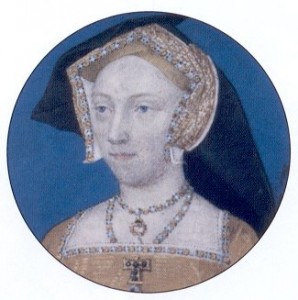
Up until now, Henry VIII had been careful to distance himself from Jane, going so far as to even spend time with other women. Eustace Chapuys, the imperial ambassador, reported that Henry VIII had “been going about banqueting with ladies, sometimes remaining after midnight, and returning by the river” and that he had also “supped lately with several ladies in the house of the bishop of Carlisle, and showed an extravagant joy”, but everything had changed now.2 It was the day before Anne Boleyn’s trial and the King was obviously confident enough to bring his relationship with Jane out into the open and to have her close to him.
Chapuys wrote to his master Charles V that Jane was “most richly dressed” and “splendidly served by the King’s cook and other officers”.3 Like Anne Boleyn before her, Jane was queen in all but name.
The Queen’s Incontinent Living
Also on 14th May 1536, Thomas Cromwell wrote to Stephen Gardiner and John Wallop, the King’s ambassadors in France, to inform Gardiner and Wallop of recent events in England. In it, he wrote of the Queen’s “incontinent living”, “incontinent” meaning lacking in self-control, and referred to the “abominable” offences committed by the Queen and “certain men”. Click here to read Cromwell’s letter.
Notes and Sources
- Letters and Papers, Foreign and Domestic, Henry VIII, Volume 10 – January-June 1536, 908
- Ibid.
- Ibid.